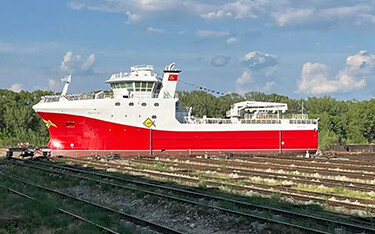Ivan Stupachenko is a Russian freelance business writer reporting from St. Petersburg for Russian and international publications on various topics. He has been a print and an online journalist for 18 years at business newspaper Kommersant. Ivan also works as an editor for St. Petersburg Travel Guide and writer for Business St. Petersburg, the city’s biggest business publication
Author Archive
Russian companies and government officials are looking for new routes for crab exports, including the use of the Northern Sea Passage and new schemes involving air, auto, and rail transport.
In a speech at the Global Fishery Forum held in late September 2022 in St. Petersburg, Russia, Russian Federal Agency for Fisheries Deputy Head Khasan Likhov said there has been increased interest in using the Northern Sea Passage –
… Read MorePetropavlovsk-Kamchatkskiy, Russia-based Lenin Collective Farm Fishery (RK Lenina) officially opened a new processing plant it has dubbed Kommandor on 19 September, 2022, with claims that the new facility is unique even by global standards.
The new facility is in the village of Oktyabrsky, located in a coastal area of the Kamchatka Peninsula in Russia’s Far East. The new facility has a daily production capacity of 230 metric tons (MT) of
… Read MoreRussian authorities, with the backing of a new law signed by Russian President Vladimir Putin, have launched a new initiative to curb salmon-roe smuggling in the country.
The new measures establish limits on the amount of salmon roe an air passenger can transport in luggage and carry-on bags, unless passengers have documents indicating the source of the product, such as a receipt from a shop. According to the law, a passenger can now carry up to
… Read MoreLandings of pelagic species in Russia have so far been exceeding totals caught in 2021.
The high catches of sardine (iwashi) and mackerel in Russia have helped the country keep retail prices for the species relatively low, an issue of enhanced importance for the Russian government. The total catch of pelagic species this year, through 1 August, is 70,600 metric tons (MT), 10 percent higher than it was at the same time last year, according to
… Read MoreRussia’s national crab fishing and shipbuilding industries have hit an important milestone as the country’s first crab-processing vessel was floated out.
The crab vessel Vaigach was launched at the Nizhniy Novgorod, Russia-based Krasnoe Sormovo shipyard in July 2022. The vessel is being built under the crab investment-quota program for the North Western Fishery Consortium, a Russian seafood conglomerate
… Read MoreEfforts by the Russian Research Institute of Fisheries and Oceanography (VNIRO) to increase the catch of anchovy in the Caspian Sea appear to be paying off, as the country’s catch has been beating expectations.
Through 4 May, 18,000 metric tons (MT) of anchovy have caught – ahead of the 2021 results, when 32,500 MT was harvested through the whole year. The 2021 number was nine times higher than the catch in 2019, when commercial
… Read MoreThe All-Russian Association of Fishing Industry (VARPE) and the Russian Far East and Arctic Development Corporation (RFEADC) – a government run investment vehicle – have signed a cooperation agreement to boost investment in fishery businesses in Russia’s far east …
Photo courtesy of Belikova
… Read MoreMurmansk, Russia-based Russian Aquaculture company is planning a new aquafeed plant in the Novgorod region that will produce salmon feed to help combat shortfalls faced by the country’s aquaculture industry …
Photo courtesy of Russian
… Read MoreThe WWF and indigenous peoples of Russia’s Far East are pushing authorities in the country to ban salmon fishing in the Amur River, which a drastic decline in spawning salmon in recent years.
The Amur River, running along Russia’s border with China, is the longest in Russia’s Far East and the tenth-longest river in the world. The river is a spawning ground for salmon stocks in the Sea of Okhotsk and the Japan Sea, and
… Read MoreThe Russian Federal Agency for Fisheries is signaling it may seek to change a unilateral agreement, signed by the former Soviet Union and the U.S. in 1990, that gives American companies 80 percent of the Bering Sea pollock quota …
Photo courtesy of the Russian Federal Agency for
… Read More















